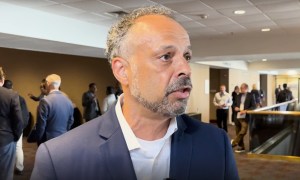Delaware Chief Information Officer James Collins to step down

Delaware Chief Information Officer James Collins will step down later this month after nearly two decades with the state government, Gov. John Carney announced Tuesday.
After spending the last six years as the state’s top technology official, leading the Delaware Department of Technology and Information, Collins will join Microsoft Consulting as a general manager focused on the company’s state and local government and higher education business.
As CIO, Collins advanced policies on cybersecurity, broadband and digital government, and pushed modernization initiatives that reached across the state. In his announcement, Carney cited Collins’ most recent work assisting a rapid statewide shift to a remote-work environment, noting that “his work and expertise has never been more important than over the last six months – as we have battled this COVID-19 pandemic.”
As one of the country’s longer-serving state IT chiefs — Collins himself joked that six years, compared to the average tenure of 29 months, makes him “a senior citizen of CIOs” — his decision to step down hinged partially on a feeling that his work was finished.
“I always tell people that at my core, I’m a military guy,” said Collins, who served eight years in the Air Force. “I get orders, I go in, I do a mission, I do that mission until I get new orders and then I go to the next mission. I feel like I accomplished the mission here of what I was supposed to do in this role.”
Public servant
Many of Collins’ credits as CIO are more recent initiatives, including work on cybersecurity legislation and a broadband program that is delivering internet access to underserved areas. He is also a former president of the National Association of State Chief Information Officers. But he said his proudest accomplishments are dotted throughout his career inside the Delaware state government, which started in 1998 when a friend tipped him off to an opening in its fleet services division.
Following the fleet services job, Collins spent a few years as a private consultant, but returned to government in 2003 when he was offered a director position at what was then called the Delaware Department of Professional Services, where he standardized processes, introduced new technologies and helped usher in new policies for how businesses must be run. Collins said was especially proud of work on developing new policies after the 2010 indictment of Earl Bradley, a Lewes, Delaware, pediatrician for raping, molesting and exploiting 103 patients.
“When it finally came out, there were a lot of questions of how could this predator have just flown below the radar for so long, and there were instances of concern that came up but they didn’t rise to the level of maybe a criminal offense,” Collins said. “The information didn’t get over to the regulatory agency where we have a lower burden of proof. So there were gaps in our system that were exploited. And so working with the governor’s office and legislature and the professional community, we put a lot of reforms in place to close those gaps, like mandatory reporting to law enforcement, to the regulatory agency and vice versa.”
Collins said that “excruciating work” included the development of new rules for medical offices, such as that if a minor is to be disrobed or partially disrobed, another staff member or caretaker must be present.
Also while at the professional services division, Collins helped his state become one of the first to implement a prescription drug monitoring program as as the nationwide opioid epidemic was worsening.
He also spent five years as Delaware’s deputy secretary of state, where he advocated for the expansion of digital government services.
Problem solver
Throughout his time as Delaware’s CIO, Collins made digital government one of his top initiatives, driving support for policies that ensure people can access services easily, and advocating for efforts that aren’t wastefully repeated in each agency. Delaware One Stop, the state’s business license and information portal, was a critical step, he said, toward a unified citizen experience that’s still yet to be fully realized, but one that many state CIOs continue to strive toward.
“I’ve been around long enough to see when we were just jazzed to have a website and we were just elated to do a transaction and have e-government,” Collins said. “And we just multiplied e-government all over the place, which I think is a natural progression. Now we’re at the point where we need to actually bring all of that together in an intelligent and intuitive interface. I feel like that we really have laid the groundwork for those things to happen in Delaware.”
Collins wound up an influential state government official, but he was almost a dentist. Growing up in Toledo, Ohio, where he said the prospect of working in a vehicle assembly plant was unappealing and the prospect of college was apparently non-existent, he followed his cousin to the military and began studying dentistry with plans to attain a full degree after completing his service. But on a whim, he signed up for a special duty assignment to teach total quality management and continuous process improvement and found he “just loved it.” And his aspirations to become a dentist quickly faded.
“I did not like it. I felt like I was just chained to a chair,” Collins said. “I like being out with people, working on processes, solving problems, doing root-cause analysis.”






